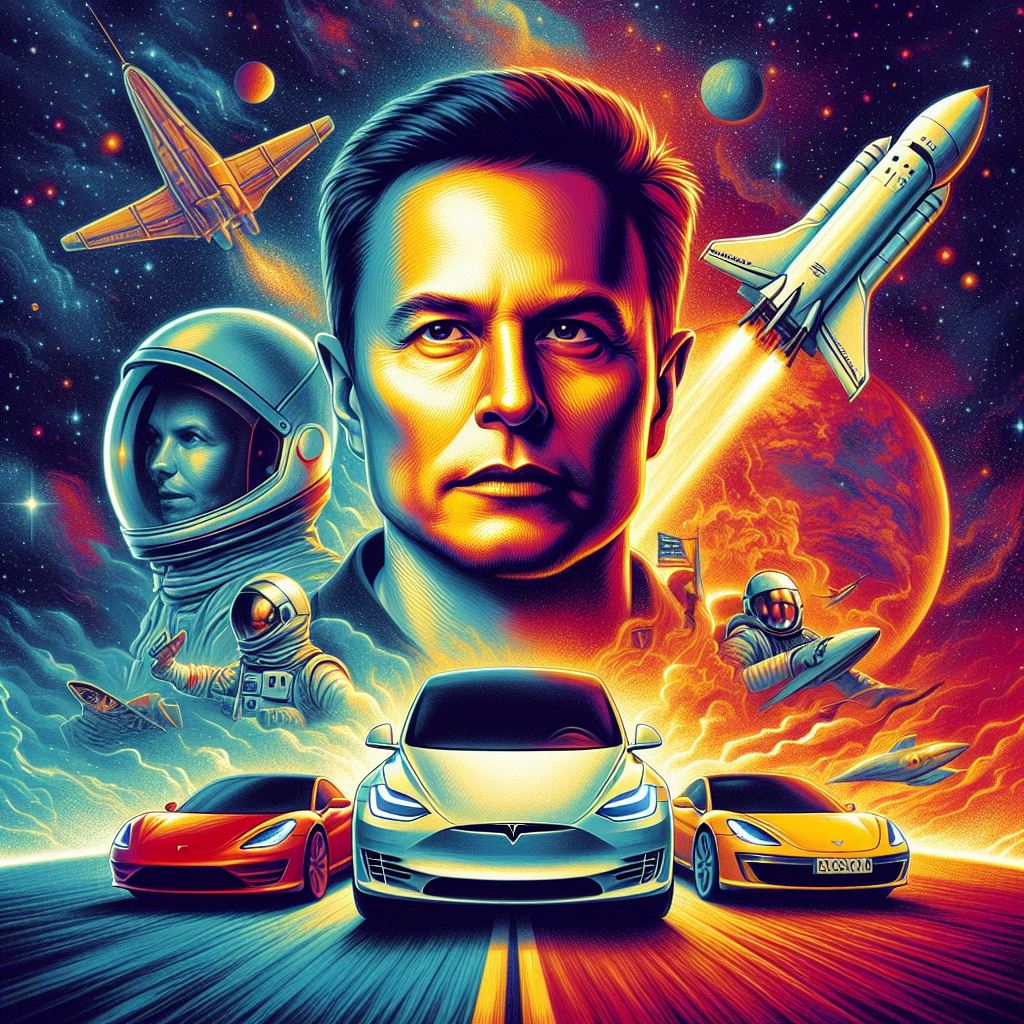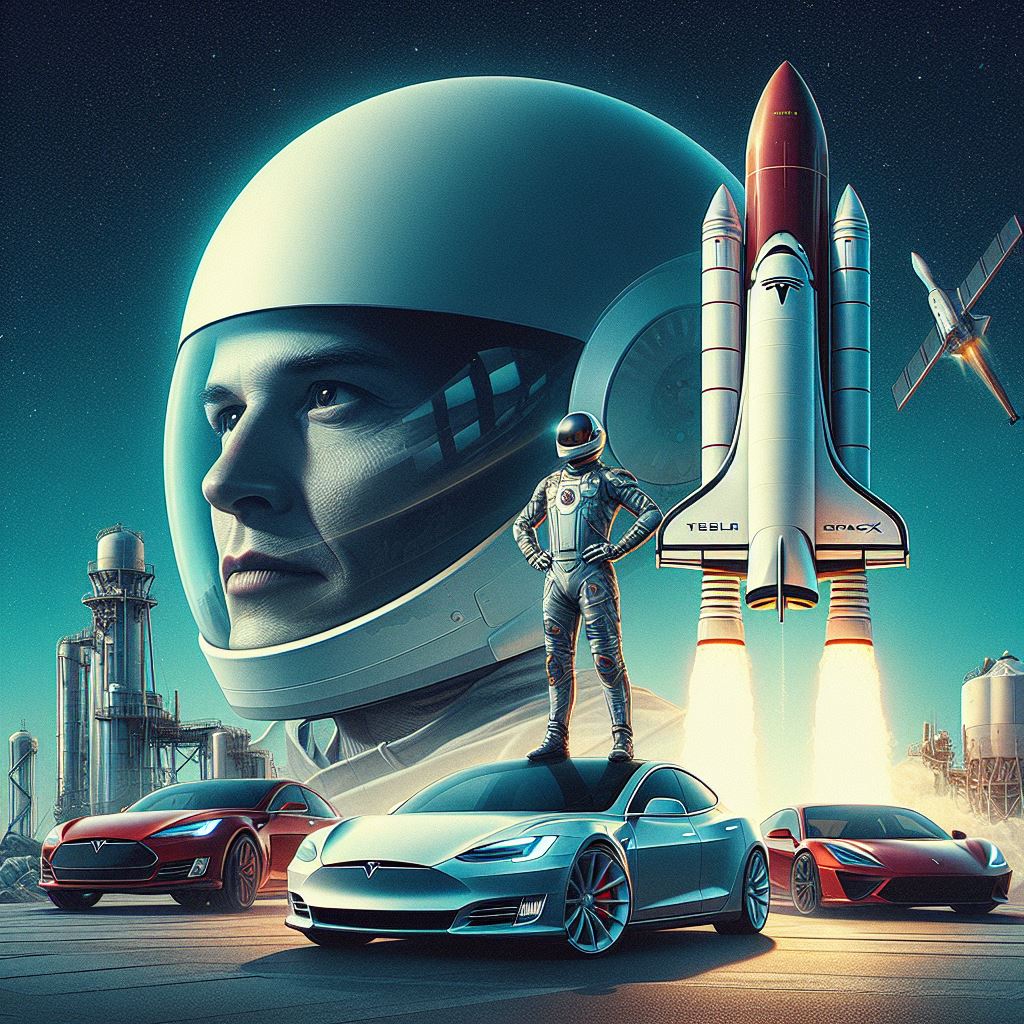Elon Musk is a visionary behind SpaceX, Tesla, and other companies who seems to live in the future while dragging the present towards sci-fi innovations ranging from reusable rockets to electric vehicles. His daring bets break records and disrupt industries, even as overpromising and disorganisation lead some schemes astray.
This article looks at Musk's five most pivotal successes that made the impossible possible, as well as his five most instructive failures, missteps, and controversies. Musk's bets demonstrate how progress necessitates risk-taking and course corrections for dreamers and innovators. The resulting hits, misses, and in-betweens teach valuable lessons about achieving goals in the face of scepticism.

5 Greatest Successes
Building History’s Most Reliable Rockets
Elon Musk fundamentally transformed spaceflight through SpaceX, the company he founded in 2002 with his $180 million PayPal fortune. Rocket science was long thought to be the sole domain of superpower governments, given the enormous expertise and billions required to simply reach orbit reliably - until Musk came along and set his sights higher. Rather than focusing on incremental improvements, the South African entrepreneur aimed to revolutionise rocketry by pioneering complete reusability.
After three failed launches that resulted in devastating explosions, SpaceX finally delivered the first commercial payload to orbit in 2008 aboard its scrappy Falcon 1 rocket on a tight budget compared to aerospace giants.
This was the beginning of the high-tech private space industry. Only 15 years later, SpaceX is one of the most trusted launch providers on the planet, with contracts for transporting astronauts and critical cargo to the International Space Station on its workhorse Falcon 9s. Falcon has transformed economics by recovering and reusing first stage boosters, and the upcoming Starship promises full reusability, unlocking interplanetary travel. Vertical landings were achieved by SpaceX years before Blue Origin.
Iterative designs, which sacrificed margins to continually invest, eventually made Falcon 9 the world's most launched orbital rocket annually, thanks to unparalleled reliability and cost savings. This commercialization and readiness for crewed flights realised Musk's audacious vision of propelling humans back to the stars by demonstrating that rockets do not have to be disposable.
Sparking the Electric Car Craze
Elon Musk sought to snap the entire auto industry towards sustainable transportation long before Tesla became the world's most valuable automaker. When Tesla was founded in 2003, critics laughed at his vision of a viable mass-market electric vehicle, citing prohibitively high battery costs and limited ranges that had stymied previous efforts.
Where others saw impossibility, Musk saw an opportunity too good to pass up. Rather than taking an easier or incremental approach by converting existing petrol cars to plug-in hybrids, Tesla committed wholeheartedly to pure battery electric luxury vehicles that match the performance of petroleum sports cars.
The scrappy startup began road testing its eye-catching Roadster sports car in 2006 before consuming another $40 million from Musk's coffers to launch it for sale in 2008. This sparked the EV spark. Through ingenious engineering and design, the mid-range Model S sedan and X crossover quickly redefined consumer expectations by providing twice the range. Tesla captured imaginations and sparked the electric transition by foregoing dealerships in favour of direct sales boosted by trendsetting showrooms.
Today, every major automaker is racing to catch up on battery powertrains as a result of Tesla's rise to become the world's best-selling EV manufacturer. Meanwhile, Tesla is developing full self-driving capabilities, as well as solar energy generation and storage solutions. Musk catapulted sustainability from a niche curiosity to the brink of a seismic market realignment.
Revolutionizing Private Space Exploration
After conquering the launch business with SpaceX, Elon Musk set his sights on elevating human activity across the solar system under his overarching goal to enable human life's extension to Mars and beyond. This meant pioneering capabilities far beyond NASA’s scope and budget.
While other agencies were stuck designing multi-billion dollar disposable rockets and capsules, SpaceX jumped ahead to create Starship, the first fully reusable space vehicle ideal for heavy cargo and eventual human transport. This massive vehicle, standing 400 feet tall, promises to slash deep space opening costs by a factor of a hundred.
Early testing resulted in explosive crashes before Starship successfully landed in space in 2021. This vehicle outperforms traditional rockets in capabilities and economy at a fraction of the cost, exemplifying Musk-led disruption.
Furthermore, SpaceX's Starlink satellite internet constellation aims to generate revenue to fund Mars infrastructure. Over 2,000 small satellites now provide global broadband internet coverage, including coverage to remote areas and aircraft. Starlink already has hundreds of thousands of subscribers in more than a dozen countries by providing connectivity comparable to ground systems.
This self-sustaining economic ecosystem aims to build deep space capabilities from the ground up. Musk moved closer to functionally launching our interplanetary age by addressing reusability and targeting applications with revenue flows.
Championing the Open AI Movement
In 2015, Elon Musk co-founded the nonprofit research organisation OpenAI with the goal of responsibly and collaboratively pioneering artificial general intelligence (AGI) for the benefit of humanity. This came after his warnings about uncontrolled AGI endangering human existence if it is developed too quickly or without safeguards against misuse or coded biases.
To stay ahead of the reckless AGI development races, OpenAI began by open-sourcing AI safety research. Following initial difficulties in obtaining enough data to train neural networks, OpenAI shifted its focus to co-development partnerships with Microsoft and others in order to accelerate capabilities while monitoring for risks.
Flagship chatbot Claude now answers questions conversationally by contextually reviewing billions of web pages and absorbing human language, ranking among the most sophisticated AIs yet developed. Its spin-off aids programmers and content creators daily. OpenAI realises Musk's early vision of expanding beneficial AI safely by pushing boundaries in ways that allow broad access.
Despite Musk's resignation from its board due to potential SpaceX conflicts, OpenAI's culture of transparency, ethics, and openness channels his warnings against unchecked AI races into promising research directions that benefit society responsibly. Its innovations continue to illuminate paths for human-machine collaboration.
Mainstreaming Brain-Computer Interfaces
Along with chips that power self-driving cars and rockets, Elon Musk helped launch Neuralink Corp in 2016 with the goal of directly connecting computers with human brains via implantable Brain Machine Interfaces (BMIs). This experimental approach is already assisting paraplegics in manipulating phones or mouse cursors using only their thoughts, restoring critical functions.
The startup's goal is to exponentially grow embedded electrodes for nonverbal two-way communication between neural centres and AI assistants. Consider browsing data or controlling devices with ideas instead of touch or voice - a conceptual leap towards augmented intelligence.
The secretive company demonstrated feasibility in 2021 by live-streaming a monkey playing pong mentally using its Neuralink implant. Though remote capabilities such as sharing one's vision are still years away, and mass surgical adoption faces significant challenges, Musk's idea of ubiquitous silent BMI apps could fundamentally expand human cognition alongside AI.
5 Failures and Controversies
Botched Autopilot Rollouts
Tesla failed full autonomy timetables despite spearheading the self-driving transition with advanced driver-assistance features marketed as Autopilot. With Musk promising fully autonomous coast-to-coast trips as early as late 2017, Tesla sold thousands of cars with questionable capabilities and instructions, resulting in fatal accidents caused by overconfident drivers.
Federal officials slammed the misleading branding and features that allow distracted driving, launching investigations as calls for stricter regulations grew. Tesla reluctantly admitted that without constant human supervision, the technology remained unreliable, and refined the troubled branding to "FSD" or Full Self Driving mode to reduce dangerous assumptions.
According to safety groups, an estimated 100,000 vehicles with inadequately trained Autopilot are still involved in rising crashes and fatalities as a result of putting too much faith in driving automation, while Tesla avoids liability. Under Musk's supervision, the botched partial autonomy rollout and hazy customer communication sparked high-profile lawsuits, lowering Tesla's brand value.

Missed Targets and Production Hell
Elon Musk's tendency to overestimate timelines regularly causes projects to fall behind schedule, pushing deadlines months or years into the future despite his demands to move quickly and hard. The problem centred on Tesla's midrange Model 3, which was supposed to be its low-cost volume vehicle but instead experienced two years of "production hell."
Musk has already demonstrated manufacturing challenges with his luxury models S and X, which have been subjected to recalls due to safety flaws. However, the difficulties in reaching mass-production scales were exacerbated by battery module shortages, assembly snags, and Musk's own reprogramming of factory software. Throughout 2016 and 2017, Tesla missed quarterly estimates, emboldening sceptics.
Suddenly, his bold vision appeared to be in jeopardy, threatening Tesla's survival until an emergency production line revamp combined with an additional cash infusion narrowly saved the day. Though Model 3 sales have since increased, Tesla continues to miss targets, including its much-delayed Cybertruck and Semi truck announcements years later due to similar battery and manufacturing constraints, casting doubt on Musk's habit of announcing products prematurely.
Hyperloop Hype Falls Flat
Elon Musk captivated technologists in 2013 when he published fanciful concept designs for a radical vacuum tube-based transport system dubbed Hyperloop, promising passenger pods hurtling at 1200 km/h between cities using airbearings for frictionless levitation. He claimed it could be built for $6 billion, or ten times less than California's current high-speed rail project.
After Musk open-sourced the specs rather than developing it, this vision sparked startups and student engineering competitions aimed at realising the science fiction-esque transit idea. Despite this, hyperloop remains more of a marketing gimmick than a practical mobility solution. Aside from limited test track demos, no proven full-scale systems exist. According to experts, costs were vastly understated, and safety issues surrounding managing near-vacuum tubes hundreds of miles long remain unresolved.
Though Musk sparked imaginative transit brainstorming, some urban planners see his hyperbole and distraction on this speculative concept as detrimental to near-term public transportation policymaking, while unfulfilled technical promises also typify overreach. Neuro link and neural lace are still impractical technologies.
Unsubstantiated Pedophile Accusations
Elon Musk received criticism after calling a British cave rescue diver a "pedo guy" on Twitter during the widely publicised 2018 Tham Luang cave crisis, after his proposed mini-submarine was deemed unworkable. Musk was sued by the target for defamation, which resulted in a defamation settlement. Musk testified that the tweet was an angry outburst, not a direct paedophilia accusation.
Nonetheless, the reckless remark from such a powerful public figure with millions of followers raised concerns about the use of large platforms to spread misinformation. Musk admitted that his "obviously a very bad idea tweet" was flawed. However, controversies resurfaced in 2022 when newly revealed court documents revealed Musk commissioned an investigator to gather evidence to support the unfounded claims. Despite the fact that no evidence was produced despite spending $50,000, Musk's willingness to pursue baseless personal attacks raised character concerns.
SEC Stock Manipulation Fines
Musk was fined by the Securities and Exchange Commission after tweeting that funding was "secured" to take Tesla private in 2018 at $420 per share, causing market tremors but with no formal buyout approval or financing in place. This compelled Tesla's board to issue clarifications, while regulators chastised Musk for providing misleading information, resulting in volatile share price swings that harmed investors.
Musk was charged with securities fraud by the SEC. Fast proposed a settlement in which Musk stepped down as chairman and Tesla and Musk each paid $20 million in penalties. However, the CEO narrowly avoided being forced to resign. Due to ongoing SEC scrutiny, his tweets must now be pre-approved by counsel.
Though Musk described the restrictions as an attack on his freedom by limiting his candour, the penalties appropriately disciplined his impulsive communication style for CEOs accountable to shareholders, serving as a speed bump on his disruptive trajectory.